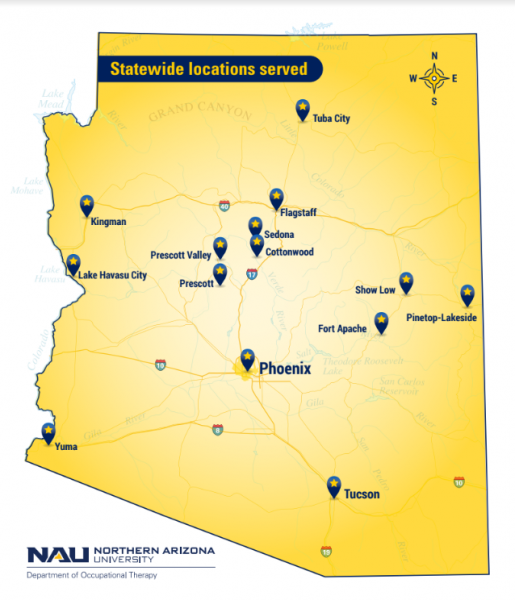Join our Graduate Program
Fieldwork
Fieldwork is an integral part of the student’s occupational therapy education and is a requirement for graduation and professional certification. The Accreditation Council for Occupational Therapy Education (2018) states, “The fieldwork experience is designed to promote clinical reasoning and reflective practice, transmit the values and beliefs that enable ethical practice, and develop professionalism and competence in career responsibilities.” The fieldwork experience is a dynamic educational process in which occupational therapy students are able to experience the roles, responsibilities, and rewards of facilitating occupational therapy services.
Level I Fieldwork
Students actively participate in three Level I fieldwork rotations. Level I fieldwork experiences occur in three semesters and are integrated within the academic courses, beginning with the summer semester of the first year, and fall and spring semester of the second year. These experiences are a minimum of 32 hours per rotation. Rotations occur over the course of the summer semester and during the last week of the fall and spring semester. Each sequence of fieldwork is individualized to connect didactic learning in diverse settings with a variety of clients that have conditions and diagnoses across the lifespan.
Students may complete rotations in traditional settings, such as a hospital, school district, or skilled nursing facility, and in emerging practice areas, such as community based mental health clinics, productive aging, and health and wellness centers. The Level I fieldwork experience may not be substituted for any parts of the student’s Level II fieldwork experience (Standard C.1.9.).
The Accreditation Council for Occupational Therapy Education (2018) states, “The goal of Level I fieldwork is to introduce students to the fieldwork experience, to apply knowledge to practice, and to develop understanding of the needs of clients.” Each Level I Fieldwork experience facilitates professional and practice-based skills acquired through coursework and progresses in expectations and rigor to prepare the student for success in Level II Fieldwork.
Level II Fieldwork
The Accreditation Council for Occupational Therapy Education (2018) states, “The goal of Level II fieldwork is to develop competent, entry-level, generalist occupational therapists. Level II fieldwork must be integral to the program’s curriculum design and must include an in-depth experience in delivering occupational therapy services to clients, focusing on the application of purposeful and meaningful occupation and research, administration, and management of occupational therapy services.” Students participate in a minimum of two Level II fieldwork rotations.
Level II fieldwork occurs consecutively in two semesters during the student’s second and third year. The first rotation is completed during the summer/fall semester and the second during the remainder of the fall semester. These experiences are full-time for a minimum of 24 weeks. A student may complete no more than one Level II fieldwork experience on a part-time basis due to an extenuating circumstance. The Academic Fieldwork Coordinator will review the extenuating circumstance and make the final decision for a part-time rotation. The student’s fieldwork site and fieldwork educator will also have to be in agreement with the part-time hours (Standard C.1.10.).
The student can complete Level II fieldwork in a minimum of one setting if it is reflective of more than one practice area, or in a maximum of four different settings (Standard C.1.10.). The students may complete these rotations in traditional and/or emerging practice settings. In all settings, psychosocial factors influencing engagement in occupation must be understood and integrated for the development of client-centered, meaningful, occupation-based outcomes (Standard C.1.3.).
Level II fieldwork provides the student an opportunity to take the knowledge obtained from didactic learning and apply it to clinical practice. Each student develops competencies unique to the setting and ultimately develop the student into a clinician and a practice scholar. Upon successful completion of both fieldwork rotations, the students have vast knowledge and experience with diverse clients who have various psychosocial, cognitive, and physical performance impairments, and the diverse service delivery models that are representative of current occupational therapy trends. The semester following the last Level II fieldwork rotation will be the student’s Capstone experience & project.
Location of Fieldwork Placement
The mission of the NAU College of Health and Human Services is to prepare students to become, and remain, excellent health professionals. The college aims to facilitate high quality learning and education, to advance knowledge and practice in the health professions, and to provide service to improve the health and well-being of the communities served, particularly Arizona residents, Native Americans and individuals considered disadvantaged. To abide by the mission of the university and college, Level I and Level II fieldwork placements are located throughout Arizona. Below is a map representing fieldwork site locations.
Fingerprint clearance card from the Arizona Department of Public Safety Accordion Closed
All students are required to have a current fingerprint clearance card on file with the department. Some agencies will require documentation of fingerprint clearance or background check of students prior to the clinical experience. Students will assume the costs and responsibility of getting the fingerprints completed as necessary before starting the OT program. A valid fingerprint clearance card issued from the Department of Public Safety in Arizona is required.
Health requirements verifications and Basic Life Support Certification Accordion Closed
Certain health and Basic Life Support requirements are in place for students for the health and well-being of our campus community and community engagement activities, including fieldwork education.
Once in the program and prior to fieldwork experiences, students will be informed and provide direction on the receipt of immunization and obtaining evidence of health clearance. This includes items such as basic life support (BLS), health insurance, immunizations and criminal background checks. The cost of all requirements are the responsibility of the students.
Contact Gina Buban, Academic Fieldwork Coordinator and Assistant Clinical Professor, at Gina.Buban@nau.edu to become a fieldwork educator or if you have fieldwork related questions.
